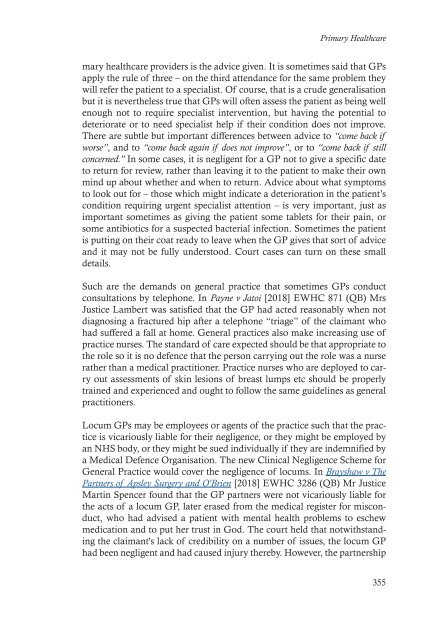- Page 1 and 2:
Clinical Negligence Made Clear A Gu
- Page 3 and 4:
Published October 2019 ISBN 978-1-9
- Page 6 and 7:
Foreword This book is a welcome and
- Page 8 and 9:
Foreword January 2019] estimated th
- Page 10:
Foreword • A question is raised a
- Page 13 and 14:
Clinical Negligence Made Clear “T
- Page 15 and 16:
Clinical Negligence Made Clear Peop
- Page 17 and 18:
Clinical Negligence Made Clear Prin
- Page 19 and 20:
Clinical Negligence Made Clear Pre-
- Page 21 and 22:
Clinical Negligence Made Clear Phar
- Page 23 and 24:
Clinical Negligence Made Clear Darn
- Page 25 and 26:
Clinical Negligence Made Clear R v
- Page 28 and 29:
Introduction When clinical negligen
- Page 30 and 31:
Introduction in the year 2018-19. 4
- Page 32:
Introduction find themselves involv
- Page 36 and 37:
Chapter 1: The Rule of Law “In a
- Page 38:
The Rule Of Law access to this part
- Page 41 and 42:
Clinical Negligence Made Clear Area
- Page 43 and 44:
Clinical Negligence Made Clear own
- Page 46 and 47:
Chapter 3: Legislation and Human Ri
- Page 48:
Legislation And Human Rights will,
- Page 51 and 52:
Clinical Negligence Made Clear If i
- Page 53 and 54:
Clinical Negligence Made Clear and
- Page 55 and 56:
Clinical Negligence Made Clear are
- Page 57 and 58:
Clinical Negligence Made Clear seea
- Page 59 and 60:
Clinical Negligence Made Clear and
- Page 61 and 62:
Clinical Negligence Made Clear pens
- Page 63 and 64:
Clinical Negligence Made Clear was
- Page 65 and 66:
Clinical Negligence Made Clear and
- Page 67 and 68:
Clinical Negligence Made Clear are
- Page 69 and 70:
Clinical Negligence Made Clear This
- Page 71 and 72:
Clinical Negligence Made Clear will
- Page 73 and 74:
Clinical Negligence Made Clear past
- Page 75 and 76:
Clinical Negligence Made Clear impr
- Page 77 and 78:
Clinical Negligence Made Clear of i
- Page 79 and 80:
Clinical Negligence Made Clear As c
- Page 81 and 82:
Clinical Negligence Made Clear be v
- Page 83 and 84:
Clinical Negligence Made Clear clai
- Page 85 and 86:
Clinical Negligence Made Clear bili
- Page 88 and 89:
Chapter 5: Other Branches of the Le
- Page 90 and 91:
Other Branches Of The Legal System
- Page 92 and 93:
Other Branches Of The Legal System
- Page 94 and 95:
Other Branches Of The Legal System
- Page 96 and 97:
Other Branches Of The Legal System
- Page 98 and 99:
Other Branches Of The Legal System
- Page 100:
Other Branches Of The Legal System
- Page 103 and 104:
Clinical Negligence Made Clear resu
- Page 105 and 106:
Clinical Negligence Made Clear inqu
- Page 107 and 108:
Clinical Negligence Made Clear repe
- Page 109 and 110:
Clinical Negligence Made Clear 12 a
- Page 111 and 112:
Clinical Negligence Made Clear gere
- Page 113 and 114:
Clinical Negligence Made Clear of t
- Page 115 and 116:
Clinical Negligence Made Clear Perh
- Page 118:
Part 2: The Principles of Clinical
- Page 121 and 122:
Clinical Negligence Made Clear NHS.
- Page 123 and 124:
Clinical Negligence Made Clear take
- Page 125 and 126:
Clinical Negligence Made Clear vict
- Page 127 and 128:
Clinical Negligence Made Clear to a
- Page 129 and 130:
Clinical Negligence Made Clear The
- Page 131 and 132:
Clinical Negligence Made Clear the
- Page 133 and 134:
Clinical Negligence Made Clear to r
- Page 135 and 136:
Clinical Negligence Made Clear that
- Page 137 and 138:
Clinical Negligence Made Clear were
- Page 139 and 140:
Clinical Negligence Made Clear ions
- Page 141 and 142:
Clinical Negligence Made Clear The
- Page 143 and 144:
Clinical Negligence Made Clear ley
- Page 145 and 146:
Clinical Negligence Made Clear This
- Page 147 and 148:
Clinical Negligence Made Clear Prin
- Page 149 and 150:
Clinical Negligence Made Clear “
- Page 151 and 152:
Clinical Negligence Made Clear Only
- Page 153 and 154:
Clinical Negligence Made Clear inse
- Page 155 and 156:
Clinical Negligence Made Clear as a
- Page 157 and 158:
Clinical Negligence Made Clear Prin
- Page 159 and 160:
Clinical Negligence Made Clear a pr
- Page 161 and 162:
Clinical Negligence Made Clear “w
- Page 163 and 164:
Clinical Negligence Made Clear disa
- Page 165 and 166:
Clinical Negligence Made Clear The
- Page 167 and 168:
Clinical Negligence Made Clear chos
- Page 169 and 170:
Clinical Negligence Made Clear risk
- Page 171 and 172:
Clinical Negligence Made Clear “T
- Page 173 and 174:
Clinical Negligence Made Clear part
- Page 175 and 176:
Clinical Negligence Made Clear Cour
- Page 177 and 178:
Clinical Negligence Made Clear to e
- Page 179 and 180:
Clinical Negligence Made Clear “1
- Page 181 and 182:
Clinical Negligence Made Clear re-a
- Page 183 and 184:
Clinical Negligence Made Clear The
- Page 185 and 186:
Clinical Negligence Made Clear that
- Page 187 and 188:
Clinical Negligence Made Clear for
- Page 189 and 190:
Clinical Negligence Made Clear tion
- Page 191 and 192:
Clinical Negligence Made Clear gros
- Page 194 and 195:
Chapter 1: Complaint and Investigat
- Page 196 and 197:
Complaint And Investigation Complai
- Page 198 and 199:
Complaint And Investigation would b
- Page 200 and 201:
Chapter 2: Turning to the Law Conta
- Page 202 and 203:
Turning To The Law time will not ha
- Page 204 and 205:
Turning To The Law “reasonable”
- Page 206 and 207:
Turning To The Law misadventure; su
- Page 208 and 209:
Turning To The Law period of compli
- Page 210 and 211:
Turning To The Law many other witne
- Page 212 and 213:
Turning To The Law should be for th
- Page 214 and 215:
Turning To The Law from a neurosurg
- Page 216 and 217:
Turning To The Law expert’s repor
- Page 218 and 219:
Turning To The Law for compensation
- Page 220 and 221:
Turning To The Law The local organi
- Page 222 and 223:
Turning To The Law of a GP’s comp
- Page 224 and 225:
Turning To The Law es, the film of
- Page 226 and 227:
Turning To The Law and would it be
- Page 228 and 229:
Turning To The Law conclusions reac
- Page 230 and 231:
Turning To The Law much as to those
- Page 232 and 233:
Turning To The Law the following:
- Page 234 and 235:
Turning To The Law For good or ill,
- Page 236 and 237:
Turning To The Law (a) from facts o
- Page 238 and 239:
Chapter 3: Beginning a Claim Starti
- Page 240 and 241:
Beginning A Claim The issued claim
- Page 242 and 243:
Beginning A Claim oxygen and blood
- Page 244 and 245:
Beginning A Claim patients. 1.3 At
- Page 246 and 247:
Beginning A Claim house were presen
- Page 248 and 249:
Beginning A Claim respiratory effor
- Page 250 and 251:
Beginning A Claim 4.3 But for the n
- Page 252 and 253:
Beginning A Claim and Gynaecologist
- Page 254:
Beginning A Claim the litigation. F
- Page 257 and 258:
Clinical Negligence Made Clear thos
- Page 259 and 260:
Clinical Negligence Made Clear Fig
- Page 261 and 262:
Clinical Negligence Made Clear (5)
- Page 263 and 264:
Clinical Negligence Made Clear (b)
- Page 265 and 266:
Clinical Negligence Made Clear the
- Page 267 and 268:
Clinical Negligence Made Clear othe
- Page 269 and 270:
Clinical Negligence Made Clear ard
- Page 271 and 272:
Clinical Negligence Made Clear the
- Page 273 and 274:
Clinical Negligence Made Clear simp
- Page 275 and 276:
Clinical Negligence Made Clear reac
- Page 277 and 278:
Clinical Negligence Made Clear Chap
- Page 279 and 280:
Clinical Negligence Made Clear fact
- Page 281 and 282:
Clinical Negligence Made Clear 1.1.
- Page 283 and 284:
Clinical Negligence Made Clear 3. P
- Page 285 and 286:
Clinical Negligence Made Clear rate
- Page 287 and 288:
Clinical Negligence Made Clear 4.4
- Page 289 and 290:
Clinical Negligence Made Clear Addi
- Page 291 and 292:
Clinical Negligence Made Clear Alte
- Page 293 and 294:
Clinical Negligence Made Clear Assi
- Page 295 and 296:
Clinical Negligence Made Clear belo
- Page 297 and 298:
Clinical Negligence Made Clear JSM
- Page 299 and 300:
Clinical Negligence Made Clear beli
- Page 302 and 303:
Chapter 7: Trial The standard direc
- Page 304 and 305:
Trial Dr Edgar Mr Riley Day 3 Exper
- Page 306 and 307:
Trial the defence might sit with th
- Page 308 and 309:
Trial The second, and usually longe
- Page 310 and 311:
Trial And then the ordeal is over f
- Page 312 and 313:
Trial medical practice. vi) Respons
- Page 314 and 315:
Trial the parties’ obstetric expe
- Page 316 and 317:
Trial “1. Judgment for the First
- Page 318:
Part 4: Particular Claims In this P
- Page 321 and 322:
Clinical Negligence Made Clear hypo
- Page 323 and 324:
Clinical Negligence Made Clear If t
- Page 325 and 326:
Clinical Negligence Made Clear Abno
- Page 327 and 328:
Clinical Negligence Made Clear tend
- Page 329 and 330:
Clinical Negligence Made Clear The
- Page 332 and 333:
Chapter 2: Wrongful Birth This is a
- Page 334 and 335:
Wrongful Birth It brings joy and so
- Page 336 and 337:
Wrongful Birth bled? The court appr
- Page 338 and 339:
Chapter 3: Accident and Emergency N
- Page 340 and 341: Accident And Emergency because they
- Page 342 and 343: Accident And Emergency or to reinfo
- Page 344: Accident And Emergency In other cas
- Page 347 and 348: Clinical Negligence Made Clear rare
- Page 349 and 350: Clinical Negligence Made Clear the
- Page 351 and 352: Clinical Negligence Made Clear to d
- Page 353 and 354: Clinical Negligence Made Clear have
- Page 356 and 357: Chapter 5: Delay in Diagnosing Canc
- Page 358 and 359: Delay In Diagnosing Cancer In order
- Page 360 and 361: Delay In Diagnosing Cancer followin
- Page 362 and 363: Delay In Diagnosing Cancer will liv
- Page 364: Delay In Diagnosing Cancer prematur
- Page 367 and 368: Clinical Negligence Made Clear “s
- Page 369 and 370: Clinical Negligence Made Clear the
- Page 371 and 372: Clinical Negligence Made Clear dece
- Page 374 and 375: Chapter 7: Neurosurgery Brain and s
- Page 376 and 377: Neurosurgery The cauda equina (hors
- Page 378: Neurosurgery Neurosurgery to the sp
- Page 381 and 382: Clinical Negligence Made Clear irre
- Page 383 and 384: Clinical Negligence Made Clear susp
- Page 385 and 386: Clinical Negligence Made Clear of h
- Page 388 and 389: Chapter 9: Primary Healthcare Gener
- Page 392 and 393: Chapter 10: Other Healthcare Profes
- Page 394 and 395: Other Healthcare Professionals info
- Page 396 and 397: Other Healthcare Professionals that
- Page 398 and 399: Other Healthcare Professionals coul
- Page 400 and 401: Chapter 11: Claims Arising from Dea
- Page 402 and 403: Claims Arising From Deaths Of Patie
- Page 404 and 405: Claims Arising From Deaths Of Patie
- Page 406: Epilogue: The Future of Clinical Ne
- Page 409 and 410: Clinical Negligence Made Clear mont
- Page 411 and 412: Clinical Negligence Made Clear the
- Page 413 and 414: Clinical Negligence Made Clear ered
- Page 415 and 416: Clinical Negligence Made Clear The
- Page 417 and 418: Clinical Negligence Made Clear and
- Page 419 and 420: Clinical Negligence Made Clear low
- Page 421 and 422: Clinical Negligence Made Clear A ta
- Page 423 and 424: Clinical Negligence Made Clear whil
- Page 425 and 426: Clinical Negligence Made Clear What
- Page 427 and 428: Clinical Negligence Made Clear the
- Page 429 and 430: Clinical Negligence Made Clear fair
- Page 431 and 432: Clinical Negligence Made Clear Word
- Page 433 and 434: Clinical Negligence Made Clear Word
- Page 435 and 436: Clinical Negligence Made Clear Word
- Page 437 and 438: Clinical Negligence Made Clear Word
- Page 439 and 440: Clinical Negligence Made Clear Word
- Page 441 and 442:
Clinical Negligence Made Clear part
- Page 443 and 444:
Clinical Negligence Made Clear Comp
- Page 445 and 446:
Clinical Negligence Made Clear Duty
- Page 447 and 448:
Clinical Negligence Made Clear Join
- Page 449 and 450:
Clinical Negligence Made Clear serv
- Page 451 and 452:
Clinical Negligence Made Clear Mult
- Page 453 and 454:
Clinical Negligence Made Clear coll
- Page 455 and 456:
Clinical Negligence Made Clear Roun













